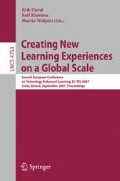Abstract
In classrooms teachers know how to motivate their students and exploit this knowledge to adapt or optimize their instruction when a student shows signs of demotivation. In on-line learning environments it is much more difficult to assess the motivation of the student and to have adaptive intervention strategies and rules of application to help prevent attrition. We developed MotSaRT – a motivational strategies recommender tool – to support on-line teachers in motivating learners. The design is informed by Social Cognitive Theory and a survey on motivation intervention strategies carried out with sixty on-line teachers. The survey results were analysed using a data mining algorithm (J48 decision trees) which resulted in a set of decision rules for recommending motivational strategies. MotSaRT has been developed based on these decision rules. Its functionality enables the teacher to specify the learner’s motivation profile. MotSaRT then recommends the most likely intervention strategies to increase motivation.
Access this chapter
Tax calculation will be finalised at checkout
Purchases are for personal use only
Preview
Unable to display preview. Download preview PDF.
References
Bandura, A.: Social foundations of thought and action: A social cognitive theory. Prentice-Hall, Englewood Cliffs, NJ (1986)
Beal, C.R., Lee, H.: Creating a pedagogical model that uses student self reports of motivation and mood to adapt ITS instruction. Workshop on motivation and affect in educational software, Amsterdam, Netherlands (July 18-22, 2005) (retrieved March 23, 2006), from http://www.wayangoutpost.net/paper/Beal&LeeCRC.pdf
Brown Jr., I., Inouye, D.K.: Learned helplessness through modeling: The role of perceived similarity in competence. Journal of Personality and Social Psychology 36, 900–908 (1978)
De Vicente, A., Pain, H.: Validating the Detection of a student’s Motivational State. In: Mendez Vilas, A., Mesa Gonzalez, J.A., Mesa Gonzalez, J. (eds.) m-ICTE2003. Proceedings of the Second International Conference on Multimedia Information & Communication Technologies in Education (2003)
Dille, B., Mezack, M.: Identifying predictors of high risk among community college telecourse students. The American Journal of Distance Education 5(1), 24–35 (1991)
Keller, J.M.: Motivational design of instruction. In: Reigeluth, C.M. (ed.) Instructional design theories and models: An overview of their current status, Erlbaum, Hillsdale, NJ (1993)
Locke, E.A., Frederick, E., Lee, C., Bobko, P.: Effect of self-efficacy, goals, and task strategies on task performance. Journal of Applied Psychology 69, 241–251 (1984)
Malone, T.: Towards a theory of instrinsically motivating instruction. Cognitive Science 4, 333–369 (1981)
McClelland, D.: Human motivation. Scott, Foresman, New York (1985)
Pajares, F., Schunk, D.H.: Self-Beliefs and School Success: Self-Efficacy, Self-Concept, and School Achievement. In: Riding, R., Rayner, S. (eds.) Perception, pp. 239–266. Ablex Publishing, London (2001)
Pintrich, P.R., De Groot, E.V.: Motivational and self-regulated learning components of classroom academic performance. Journal of Educational Psychology 82(1), 33–40 (1990)
Pintrich, P.R., Garcia, T.: Student goal orientation and self-regulation in the college classroom. In: Maehr, M.L., Pintrich, P.R. (eds.) Advances in motivation and achievement: Goals and self-regulatory processes, vol. 7, pp. 371–402. JAI Press, Greenwich, CT (1991)
Pintrich, P.R., Schunk, D.H.: Motivation in education: Theory, research, and practice. Prentice Hall, Englewood Cliffs, NJ (1996)
Qu, L., Wang, N., Johnson, W.L.: Detecting the Learner’s Motivational States in an Interactive Learning Environment. In: Looi, C.-K., et al. (eds.) Artificial Intelligence in Education, pp. 547–554. IOS Press, Amsterdam (2005)
Rotter, J.B.: Generalized expectancies for internal versus external control of reinforcement. Psychological Monographs, 80 (Whole No. 609) (1966)
Weiner, B.: Achievement motivation and attribution theory. General Learning Press, Morristown, NJ (1974)
Witten, I.H., Frank, E., Trigg, L.E., Hall, M., Holmes, G., Cunningham, S.J: Weka: Practical machine learning tools and techniques with Java implementations. In: Proc. ICONIP/ ANZIIS/ANNES99 Future Directions for Intelligent Systems and Information Sciences, Dunedin, New Zealand, pp. 192–196 (November 1999)
Zhang, G., Cheng, Z., He, A., Huang, T.: A WWW-based Learner’s Learning Motivation Detecting System. Proceedings of International Workshop on Research Directions and Challenge Problems in Advanced Information Systems Engineering, Honjo City, Japan (September 16–19, 2003), http://www.akita-pu.ac.jp/system/KEST2003/
Zimmerman, B.J.: Theories of self-regulated learning and academic achievement: An overview and analysis. In: Zimmerman, B.J., Schunk, D.H. (eds.) Self-regulated learning and academic achievement: Theoretical perspectives, 2nd edn., pp. 1–37. Lawrence Erlbaum Associates, Mahwah, NJ (2007) (The Journal of Educators Online, vol. 4(1) (January 21, 2007)
Author information
Authors and Affiliations
Editor information
Rights and permissions
Copyright information
© 2007 Springer-Verlag Berlin Heidelberg
About this paper
Cite this paper
Hurley, T., Weibelzahl, S. (2007). Using MotSaRT to Support On-Line Teachers in Student Motivation. In: Duval, E., Klamma, R., Wolpers, M. (eds) Creating New Learning Experiences on a Global Scale. EC-TEL 2007. Lecture Notes in Computer Science, vol 4753. Springer, Berlin, Heidelberg. https://doi.org/10.1007/978-3-540-75195-3_8
Download citation
DOI: https://doi.org/10.1007/978-3-540-75195-3_8
Publisher Name: Springer, Berlin, Heidelberg
Print ISBN: 978-3-540-75194-6
Online ISBN: 978-3-540-75195-3
eBook Packages: Computer ScienceComputer Science (R0)

